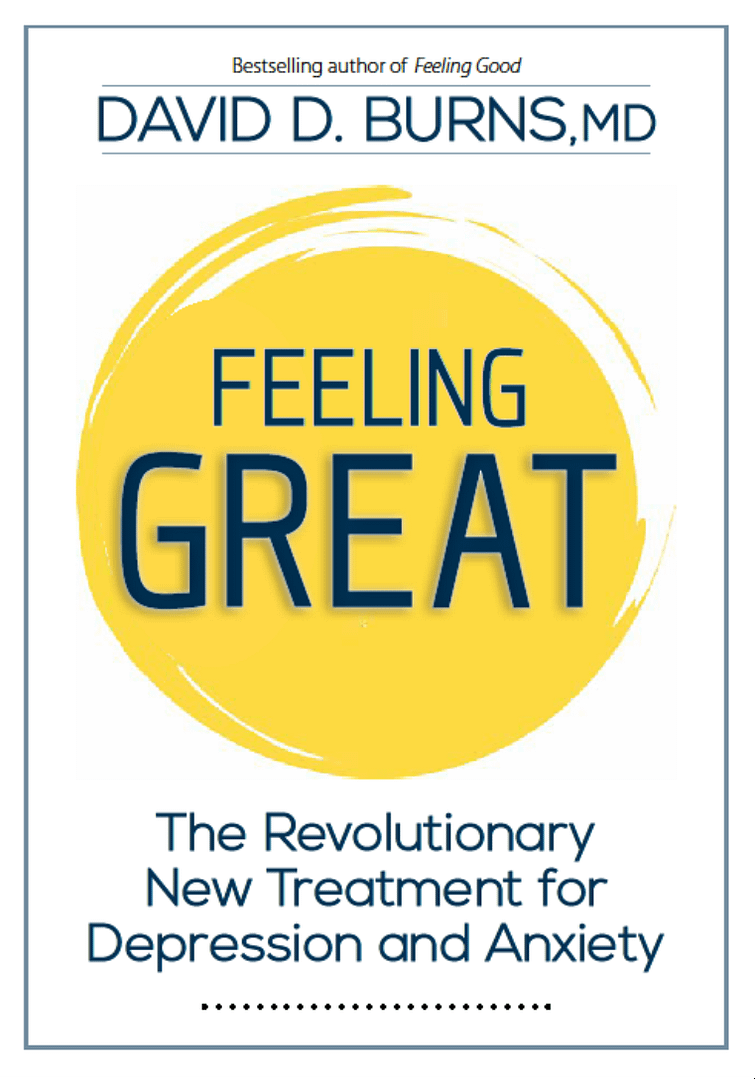Ask David: Burn Out; When Challenging Thoughts Doesn’t Work; and more!
Featuring Dr. Matthew May
In today’s podcast, Matt, Rhonda and David discuss four challenging questions from podcast fans like you:
1. Joseph asks if it’s okay to take a break when you get “burned out.” Below, David expands on this and describes the difference between “healthy” and “unhealthy burnout.”
2. Joseph also asks why your feelings might not change when you challenge your negative thought with a positive thought that’s 100% true.
3. Dan asks about Step 4 of the Relationship Journal, which is the most difficult and important step in the TEAM interpersonal model—see exactly how you’re forcefully causing and reinforcing the very relationship problem you’re complaining about. For example, if the person doesn’t “listen,” you’ll see that you’re forcing them not to listen. If she or he doesn’t open up and express feelings, you’ll see that you prevent them from opening up. And if you think your partner doesn’t treat you in a loving and respectful way, you’ll suddenly see exactly why this is happening—if you have the courage to take look and see: But if fact, this is one of the “Great Deaths” of the “self” in TEAM-CBT, and very few folks are willing to “die” in this way.
4. Finally, Clay asks about EMDR. He’s been treated with it without success. David and Matt weigh in with their thoughts about EMDR. This question was not addressed on the podcast, since some practitioners of EMDR might be offended by David and Matt’s thinking, but they did describe their thoughts in the show notes below. If you are an EMDR enthusiast, you might prefer NOT to read our comments.
Joseph writes:
Thanks, David, for sharing so much on the podcasts! I have a couple questions.
Personally, I find that when I’m burnt out, I get a lot more anxious automatic thoughts. While it’s definitely good to combat these distorted thoughts by replacing them with realistic ones, my takeaway is that it’s also sometimes wise to change our lives / circumstances (e.g. to take a break).
By the way, I also wanted to ask if you’ve ever faced a situation where you are convinced that a thought is distorted and irrational (and you know what the realistic thought is), but you still can’t shake it off? I sometimes get stuck when I already know the “right answer” (ie. what the realistic thoughts are based on the methods you’ve taught), but I just can’t seem to get my brain to fully believe it.
For example, I was recently on vacation and a small blip made me think “my vacation is ruined!”. I immediately identified it as all-or-nothing thinking, and replaced it with “my vacation is still going very well even if it’s not perfect” (and I’m convinced this thought is true), but somehow my mind kept going back to the automatic thought again and again. Curious if you’ve ever experienced this.
Thanks again so much for your time and your teaching; just wanted to say I really appreciate it! 🙂
Regards
Joseph
David’s Reply to Joseph.
Thanks for the great questions. We address both of them on an upcoming podcast.
Here’s the quick response. Yes, it is okay to take a break when you feel “burned out.” However, you can get “burned out” in a healthy or unhealthy way. For example, after I edit for two or three hours, which I love, my brain gets “burned out.” So I take a break and come back later, maybe even a day later, and I feel refreshed and filled with enthusiasm about writing and editing some more, because I love these activities.
When I was in private practice in Philadelphia, I saw 17 patients back to back on Wednesdays. That way, I could have a three day weekend.
Actually, I loved it and as the day went on, I got higher and higher. At the end I was exhausted, but exhilarated. I was never “burned out” because I loved what I was doing, and the clinical work was SO rewarding!
However, sometimes I made a mistake and a patient would get very upset, sometimes angry with me, or felt hurt.
THAT was when I got suddenly burned out and exhausted. But it wasn’t because of my work, or the conflict, but rather my thoughts about it, which generally involved a combination of self criticism and frustration with the patient, both the result of distorted thoughts, generally Self-Directed and Other-Directed Should Statements.
And THAT kind of “burned out” won’t improve with a break. The answer is challenging and changing your own inner dialogue, as well as your dialogue with the other person, using the “failure” in the relationship as an opportunity to listen and support and create a deeper and more meaningful relationship.
With regard to your second excellent question, we explored that in depth in the podcast, and also made it a problem for our listeners to think about. So tune in for the answers! This is a popular question I’ve been answering for more than 40 years, and the answers tell us a great deal about how cognitive therapy actually works.
Thanks so much, Joseph!
Subject: Relationship Journal Gem I Found
Dan (a former participant in David and Jill’s Tuesday training group at Stanford) writes:
Hello to the Dynamic Duo (David and Jill),
I came across this doc for Step 4 of the Relationship Journal, but I don’t really understand it and I don’t remember the context. I know it was from the Tuesday Group years ago.
It says it’s about conceptualizing the problem, just not sure how to utilize this in step 4. Thanks.
(You will find this document in the show notes below.)
~Dan (Daniel C. Linehan, MSW, LCSW)
David’s Reply
Hi Dan,
Great question. In this document, I am trying to make it a bit easier for folks to see how they are triggering the very problem they are complaining about. So, I have listed three categories of common complaints.
For example, an Empathy complaint would be that “My partner doesn’t listen,” or “always has to be right.”
Then you ask, “If I wanted to force my partner to behave like this, how could I so?”
Well, one good way would be to interrupt when your partner is trying to talk, or argue and insist your partner is wrong when they’re trying to make a point, and so forth. This would force your partner to argue and insist that they are right!
It is pretty basic and obvious. But most human beings don’t “get it,” and in part that’s because a great many don’t want to. Blaming the other person seems way more popular than looking at your own role in the problem these days.
Good to hear from you on this important topic!
People can usually “see” how step 3 of the Relationship Journal works—you simply examine what you wrote down in Step 2, and you can almost always see no E (Empathy), no A (assertively sharing your feelings with “I Feel” Statements, and no R (conveying respect or liking to the other person, even when you’re angry.)
But most people don’t seem to have the natural mental aptitude or the stomach for Step 4, where you go beyond Step 3 and explain EXACTLY how you FORCE the other person to behave in the exact way you’re complaining about. The document in the link is an attempt to help people with Step 4—IF you are willing to examine your own role in the problem.
In Step 4, you ask yourself what category you see the other person in, and there are three choices to make it fairly simple. You might feel that they don’t listen or try to see your point of view. This would be an E = no Empathy complaint.
Or you might feel like they can’t, or won’t, share their feelings. Instead, they might just keep arguing, or they might refuse to open up. This would be an A = no Assertiveness complaint.
Or, you might complaint that they don’t treat you with warmth, love, or respect. That would be an R = no Respect complaint.
This makes it much easier to “see” how your response to the other person in Step 2 actually causes and reinforces the exact behavior you’re complaining about. Lots of people get defensive or annoyed at this step of the RJ, and refuse to continue! That’s because Step 4 is all about the third “Great Death” of the “self,” or “ego,” in TEAM-CBT. Most of us don’t want to “die” in this way. It can feel humiliating, or shameful, to pinpoint your own role in the problem.
But, there’s usually a big reward—you’re suddenly “reborn” into a far more loving and satisfying relationship. In the podcast, brave and wonderful Rhonda provided David and Matt with an example when she was visiting her son and daughter in law in Germany last month to help out with their twin baby girls. This example really brings this “Great Death” to life, and we are grateful to Rhonda for helping us in this very vulnerable and real way!
Feel free to ask again if I have not made it clear. To me, this phenomenon of causing the very problems we are complaining about in our relationships with others is incredibly fascinating. However, change involves the “death of the self,” which is painful, because you have to see, usually for the first time, your own role in the problem you’re complaining about. It is based on the Buddhist idea that we create our own interpersonal reality at every moment of every day.
In other words, we CREATE our enemies, and then whine and complaint about it!
Most people don’t want to see this! They want the therapist (or friend they’re confiding to) to agree that the other person REALLY IS a jerk, or to blame, or whatever. They just want to complain and blame and feel superior!
In my book, Feeling Good Together, I think I said something to the effect that we “want to do our dirty work in the dark.” In other words, we don’t want to turn the lights on so we can “see” how we’re actually causing the conflict.
The person asking for help can nearly always be shown to be the 100% cause of the conflict. This technique is one I recommend when working with an individual, and not a couple. Other less confrontational techniques are probably more effective when you are working with both partners at the same time.
Warmly, david (David D. Burns, MD)
Here’s the document:
Conceptualizing the Patient’s Complaint in
Step 4 of the Relationship Journal (RJ)
By David D. Burns, MD*
Problem Area |
Specific Complaint—S/he |
Complaints about the other person’s lack of E = Empathy |
|
Complaints about the other person’s lack of A = Assertiveness |
|
Complaints about the other person’s lack of R = Respect |
|


